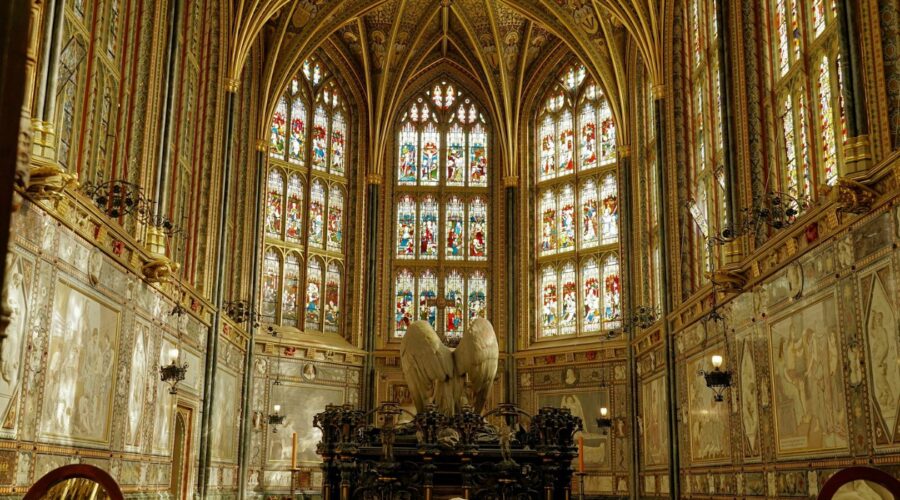Your cart is currently empty!
St Peter: Exploring the Life, Beliefs, and Significance of the Rock Upon Which the Church Was Built

Introduction
St Peter, known as the “Rock” upon which Jesus built his church, holds a central position in Christian history and theology. As one of the twelve apostles, he played a pivotal role in the early development of the church and left a lasting legacy that continues to shape the faith today. This comprehensive guide dives into the life, beliefs, and significance of St Peter, providing a detailed exploration of his character, teachings, and impact on Christianity.
A Fisherman from Galilee: Peter’s Early Life
Peter was born Simon in Bethsaida, a small fishing village on the Sea of Galilee. The son of John and brother of Andrew, he grew up in a humble family and earned his living as a fisherman. Despite his simple upbringing, Peter possessed a strong and inquisitive nature that would later lead him to become a prominent disciple of Jesus.
Called to Follow Jesus: Peter’s Conversion
Peter’s life took a transformative turn when he encountered Jesus. According to the Gospels, Jesus called out to Peter and his brother Andrew as they were casting their nets into the sea. Moved by Jesus’ words and presence, Peter left his boat and followed him. From that moment, Peter’s life would be forever intertwined with the teachings and mission of Jesus Christ.
A Key Figure in the Early Church
As a disciple of Jesus, Peter played a central role in the early church. He was among the twelve closest followers of Jesus, witnessing his miracles, teachings, and ultimately his crucifixion and resurrection. Peter was known for his boldness and enthusiasm, earning him the nickname “Cephas,” meaning “rock” in Aramaic. It was on this “rock” that Jesus declared he would build his church (Matthew 16:18).
Mission to the Gentiles
While Peter was initially commissioned to preach primarily to the Jewish people, he later received a vision from God that led him to minister to the Gentiles as well. This significant event marked a turning point in the history of Christianity, as it opened the door for the faith to spread beyond its Jewish roots and reach people from all nations.
Peter’s Teachings and Beliefs
Peter’s teachings and writings, particularly his two epistles in the New Testament, provide valuable insights into his beliefs and understanding of the Christian faith. In his letters, Peter emphasizes the following key themes:
- Salvation through faith in Jesus Christ: Peter taught that salvation is not earned through works of the law but is received by grace through faith in Jesus Christ (1 Peter 1:18-19).
- The importance of holiness and good works: While Peter emphasized the free gift of salvation, he also taught that Christians are called to live holy and righteous lives, reflecting the character of God they serve (1 Peter 1:14-16).
- Suffering and persecution as a means of growth: Peter recognized that Christians may face trials and tribulations, but he encouraged them to view these experiences as opportunities for spiritual growth and refinement (1 Peter 5:6-11).
Peter’s Legacy and Significance
Peter’s legacy extends far beyond his lifetime. He is considered one of the foundational pillars of the Christian faith, and his teachings and writings continue to shape Christian doctrine and practice today. His enduring significance includes:
The First Pope
According to Catholic tradition, Peter was appointed by Jesus as the first pope, or leader of the church. This belief is based on passages such as Matthew 16:18-19, where Jesus gives Peter the “keys to the kingdom of heaven.” While the historical accuracy of this claim is disputed among different Christian denominations, Peter’s central role in the early church is widely acknowledged.
Founder of the Christian Church in Rome
Peter is believed to have traveled to Rome and preached the gospel there. According to Christian tradition, he was martyred in Rome during the reign of Emperor Nero. The Vatican, the center of the Catholic Church, is built on the site where Peter was believed to have been crucified.
Patron Saint of Fishermen and the Papacy
Due to his vocation as a fisherman before becoming a disciple of Jesus, Peter is considered the patron saint of fishermen. Additionally, he is the patron saint of the papacy, as he is seen as the first in the line of popes who have led the Catholic Church throughout history.
Conclusion
St Peter was a pivotal figure in the history of Christianity, leaving an enduring legacy that continues to shape the faith today. From his humble beginnings as a fisherman to his role as a key disciple of Jesus and the traditional founder of the church in Rome, Peter’s life and teachings provide a rich tapestry of faith, leadership, and enduring significance. Understanding Peter’s journey and beliefs offers invaluable insights into the foundations and core tenets of Christianity.